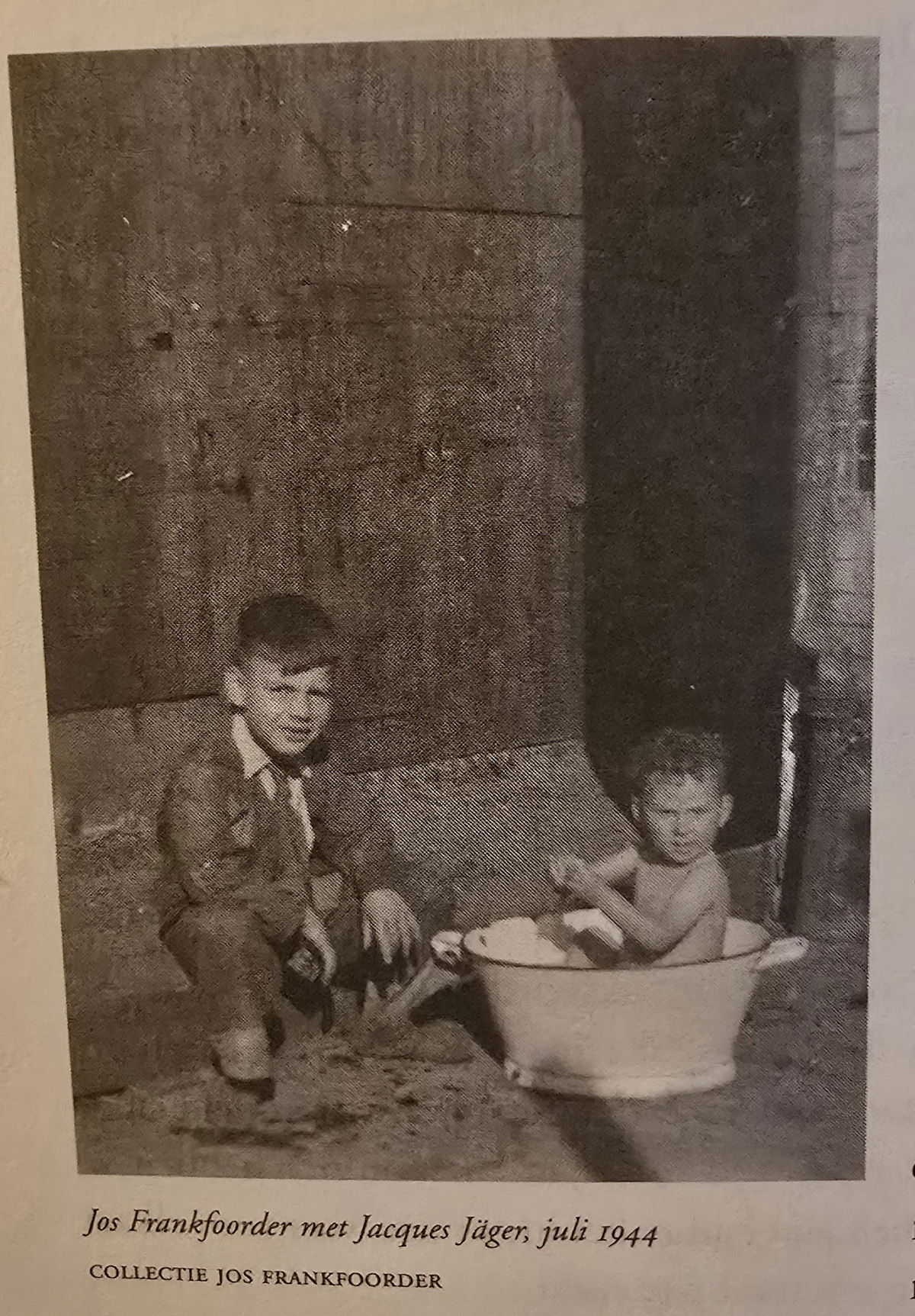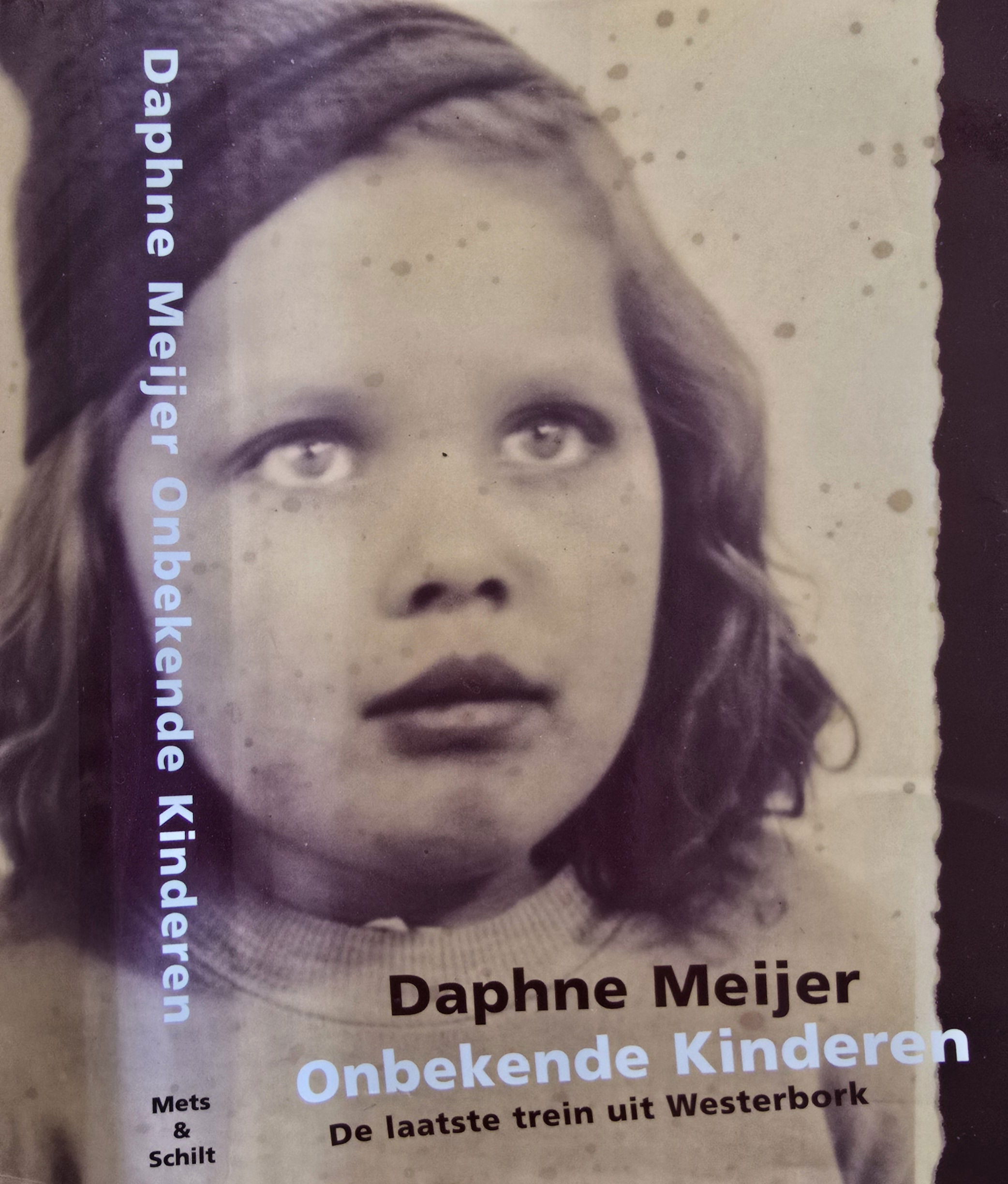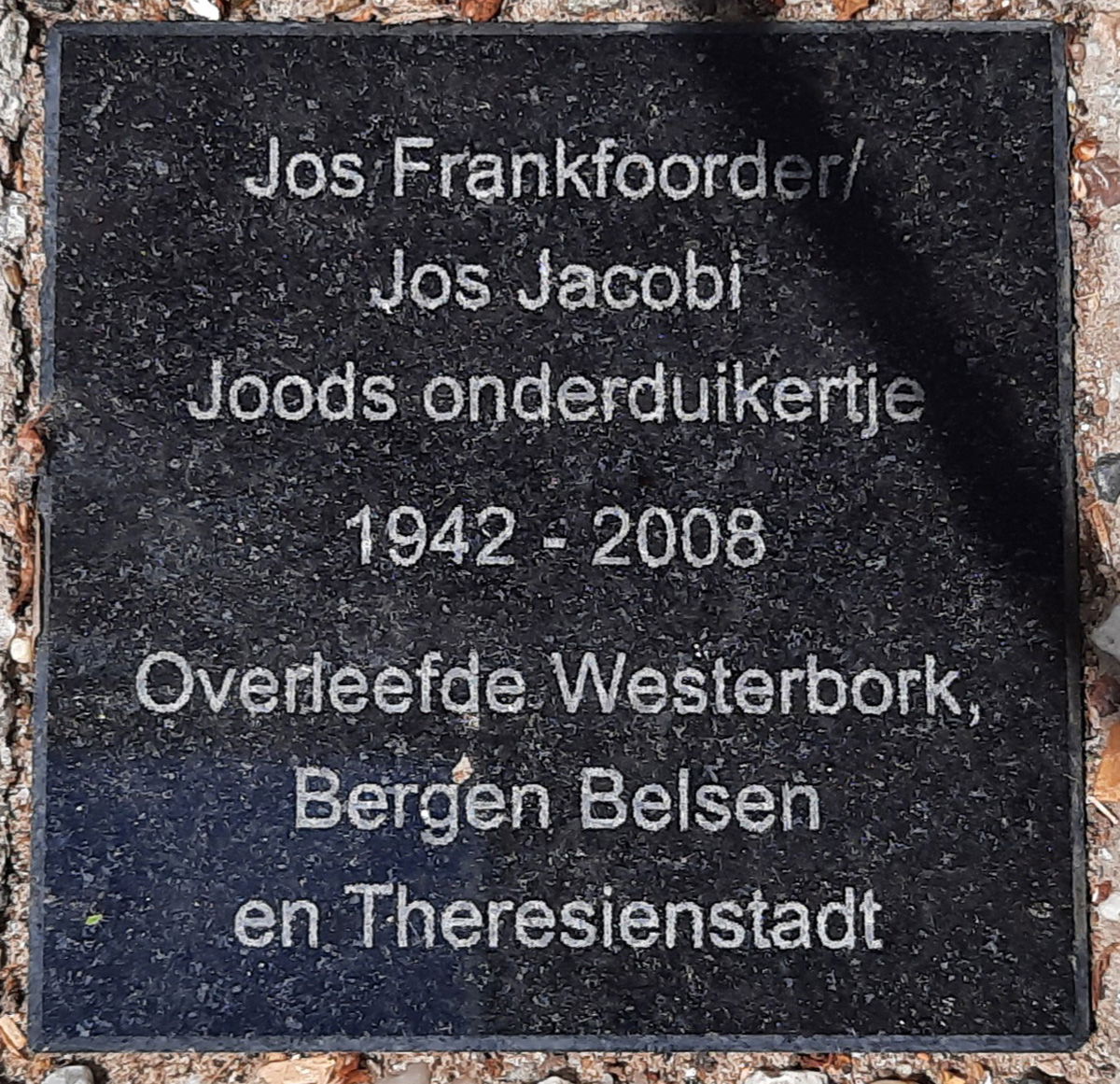Unknown Children
I dedicate this story to my friend Jos (Jonas Robert) Frankfoorder, who died on 16 June 2008. As a two-year-old Jewish toddler, he was one of the 50 unknown children who left for Auschwitz on 13 September 1944 with "The last train from Westerbork" via Bergen-Belsen concentration camp, but miraculously ended up in Theresienstadt and returned home eighty years ago. In Zeist, he was also known as Jos Jacobi, a Persian carpet dealer at Jagerlaan 22A, corner Cronjélaan. However, he never wanted to adopt this name until his death; his own name Frankfoorder was the only part of himself that he still had.
Jos was born on 20 May 1942 in Amsterdam as the only child of tailor Jacob Frankfoorder and Vrouwtje (Fré) Frankfoorder-Halberstad. They were both murdered in Auschwitz on 31 January 1944 at the age of twenty-seven. Jos escaped via the crèche in 1943 through a resistance organisation and was taken by students to the Snelleman family in Zeist. Piet Jacobi, who, like Mr Snelleman, was in a resistance group, asked if he and his wife Adri could take care of the baby and the mother was of course also very welcome. Fré Frankfoorder managed to take the train to Amersfoort but was arrested and never saw her nine-month-old son Jos again. Jos's father had already been arrested earlier. The police and NSB members had heard that a Jewish boy, named Fritsje, about six years old, was in hiding at baker Hardeman, the neighbours of the Jacobi family in the Jagerlaan. When they came to get them, they saw Jos playing in the front yard and took him along with his six-year-old foster brother Jacques. The three of them were deported to Camp Westerbork in August 1944. Foster mother Adri Jacobi-de Jong was arrested and held in The Hague. The only tangible evidence of his parents that Jos had were his marriage certificate, photos and letters that his father wrote to his mother from Westerbork.
Completely unexpectedly, the then three-year-old Jos arrives in Eindhoven in 1945 by plane, where Mrs. Jacobi is waiting for his foster brother Jacques. Jacques Jäger is not there, but Jos, who was there, she could not take with her. She traveled with him to a reception camp in Amsterdam, from where she took him home. The controversial organization Commission War Children OPK, the guardianship organization that was set up to represent the interests of Jewish minors who had been orphaned by the persecution, prevented Jos from being adopted by aunt Rachel, his father's sister and only surviving relative (with her son). The recovering aunt, who survived Auschwitz, had in the meantime married Eddy van Amerongen and wanted to take Jos and her son Dees to Palestine in 1950. Dees' father had been arrested because of his involvement in the February strike in 1941 and died in Auschwitz in November 1942 as a result of torture. The fact that she was not married to Dees' father was used by the Jacobis to not give up their foster son Jos. Jos said: "The Jews in the OPK board agreed that I had to stay in the Netherlands and gave me away. That's how it feels." Jos could still get furious when he thought about it and could not accept it. He was not grateful to the Jacobis. They had done it for themselves, claimed him. He should have gone to Israel. Because Jos did not grow up Jewish, he felt like a mountain lion among desert lions. The war raged on in Jos's mind, he had trouble with authority and always sought confrontation.

Jos & Janny and Pieter
Jos lived with his wife Janny van der Meij and son Pieter Johan on Ernst Casimirlaan, right behind my parental home on Charlotte de Bourbonlaan. It was not until 1979 at Tennisvereniging Griffensteyn that I got to know this special man with outspoken opinions, sarcasm, teasing and gallows humor. If he liked you, he would go through fire for you, but oh dear if that was not the case, you better hide yourself. Pieter was their only child, but this social couple lovingly took in many foster children with a backpack and gave them a good start in life. That is how I remember Sandra, Lia, Arthur and Niels, but there were many more. Pieter died in 1990 at the age of seventeen from leukemia. I felt terrible for Jos and Janny that their only child died from this disease at such a young age. Jos's entire family on his father's and mother's side, except for his father's sister, aunt Rachel, and her son Dees, were murdered in extermination camps during the war. Together they had cared for so many foster children and then the only part of you dies from this horrible disease. How cruel the world is and life is unfair, I thought. How does a person find the strength to continue.
I remember well that after Pieter's death we were sitting in Jos and Janny's garden during the condolences. Aunt Rachel, who gave lectures about the Holocaust all over the world, was there too and I was sitting next to this charismatic woman. At one point the conversation with her turned to Jos' parents and I said: "They died in the war, didn't they?" As if stung by a wasp, Aunt Rachel jumped up and shouted "Died, died? They were murdered! When are you finally going to say that?" She immediately apologized and said that it was not meant for me personally but more in general. Yes, she was right, they were murdered during the Holocaust, also called the Shoah, just like 101,800 other of the 140,000 Jewish people in the Netherlands. In no other country in the world were so many Jewish people murdered. My fear of shocking/hurting her had the opposite effect. I have learned from that and from now on I will call a spade a spade.

Back to “Unknown children and Jos” On May 17, 2001, Jos gave me a personally signed version “For my friend Arnoud” of the book “Unknown Children” written by Daphne Meijer. The last train from Westerbork. On September 13, 1944, this last transport with 279 Jewish prisoners left for the Bergen-Belsen concentration camp. Jos, who was only two years old, was on this train with fifty two- to eleven-year-old “Gruppe Unbekannte Kinder” accompanied by four carers. They had all been arrested without their parents from their hiding places and the identity of most of them was not entirely clear. The name tags of the children whose identity was not irrefutably established had the text “Unbekanntes Kind” written on them, which hung on a string around their necks. A nine-month-old baby died during the journey to Vorzugslager Bergen-Belsen on the Lüneburger Heide, the rest of the group travelled on after two months in November to Theresienstadt (now: Terezín), west of Prague, where they lived as a group in an orphanage until they were liberated by the Russians in May 1945. This impressive book, which has also been made into a film, is a must-read.
I received this book because Jos wanted to share his life with me and because he had just read my story and had also experienced what had happened to our daughter. My Saskia and I were still in complete shock and recovering from weeks in the Utrecht Medical Center, where our eighteen-year-old daughter Charlotte had barely survived bacterial meningitis. She had been given up on by the doctors but not by us and was reborn after five days in a coma. Since that day in 2001, Saskia and I have celebrated her second birthday every year on March 14. Jos and Janny planted 5 trees in the “Unknown Children Park” between Arad and Bëer Sheva in Israel on the occasion of our 25th wedding anniversary on July 3, 2005 and in memory of my father. We did the same for Janny on June 16, 2008 “In loving memory of Jos”.
After the above exchange about our lives, the bond with Jos became even closer, we were each other's friends and he confided a lot about his past to me. Including the following. Somehow, while he remembered nothing of his stay in the Czech Republic, this Czech Republic continued to attract Jos and he bought haberdashery there as a trader. On one of those trips he came to Theresienstadt, which is about 60 km above Prague. In that place Jos stopped in front of a building that later turned out to be the orphanage where he had been for more than 10 months as a two-year-old "Unbekanntes Kind".
At that time he drove through Germany and crossed the border with the Czech Republic near Marktredwitz towards Cheb and passed Sokolov on the way. Sokolov was the former Falkenau, the place where the Americans and the Russians met in 1945. The German population was expelled and Falkenau was incorporated by the Russians and the name changed to Sokolov in 1948. Jos stayed here during his travels and became friends with Vladja and his wife Svetlana. For years I drove to Sokolov together with Jos and ten other tennis friends in the eighties for our annual tennis tournament. We stayed at our tennis friends' homes all those years and when they came to the Netherlands the following year they stayed with you again. Those were wonderful times and our tennis friends from the Czech Republic came to the Netherlands with their wives every other year at some point. In the Netherlands Jos organised the tournament together with me and we also bought drinks and other things together in Amsterdam from a cousin of Jos. Over the years, our wives also joined us and outings were organised back and forth.
Reflections
Jos and Janny went on holiday to America and Yellowstone Park in July 2003. He was deeply impressed by this natural force and had an association with concentration camps at first sight. He wrote “Reflections” in August of that year. A quote from it: “How were we able to survive when we were so underprivileged. Coincidence? God’s will? As an atheist, I am quickly done with the second. I have always had a lot of sympathy for the first, but the real conviction was lacking, now that Yellowstone has no longer provided me with the proof. I hope that what happened to us will still be as unnatural and unbearable in a hundred years’ time as it is now”.
Jos Frankfoorder, August 2003
The complete story “Reflections” was also read during his cremation on 23 June 2008 and you can also read and find it in the photo gallery under the tab “Jos Frankfoorder”.
Some statements and events of Jos that I remember
• At the age of twelve, his foster father asked Jos, who was called Jos Jacobi at school, if he wanted to formalize his name to Jacobi. Jos did not want that "My name is the only thing I have left of myself".
• When he was called up for military service in 1959, he was told that he had to do it in Germany. Jos's answer was "Then I want to take a loaded machine gun with me". Jos was then sent to La Courtine in France.
• A border guard who asked Jos what he was doing when he was on his way to the Czech Republic was told "Ich bin hier nur zum scheißen".
• To the anaesthetist who asked if he had any questions before the operation, Jos said "Please be careful with the gas, my family has had bad experiences with that".
• Pieter and Niels received money for good grades. They only received money for the German subject if they failed.
• In 1988, after a fun tennis tournament in Hoenderdaal Driebergen, Jos was given a breath test during an alcohol check. Have you been drinking?, to which Jos replied, “yes, five beers”. The breathalyser indicated nothing, to which a second one followed. Again nothing, to which the officer replied: “you have had five beers, haven’t you?” “Yes”, was the answer, “Buckler”. Jos had to go to the station for a blood test.
• During a tennis match, a quick underhand serve, leaving the opponent bewildered
This was Jos in a nutshell. Always seeking confrontation and sucking, a wonderful friend. My position is therefore "If you know what happened to a person, you understand better why this person is the way you experience him" and so also this special man with outspoken opinions, sarcasm, teasing and gallows humor.
Because there was a big chance that I would not see him again, I said goodbye to him at Jos's home before we left for Italy. On June 16, Janny called me with the terrible news of his death.
Jos died on June 16, 2008 at the age of 66 on his last trip, deliberately not at home but during a cruise to the North Cape, in the William Harvey Hospital in Ashford, England.

In memory of Jos's hiding, a "Memorial Stone" was laid in front of the Jacobi's Oosters Tapijthuis at Jagerlaan 22A on May 25, 2022, at which his foster daughter Sandra and her daughter and I were allowed to be present.
I love you Friend and even if you didn't believe, we will see each other again, but if you don't mind I will wait a little longer.
Arnie
In the gallery of the website https://www.als-bomen-en-stenen-konden-praten.com/galerij you can find photos and documents concerning Jos Frankfoorder.